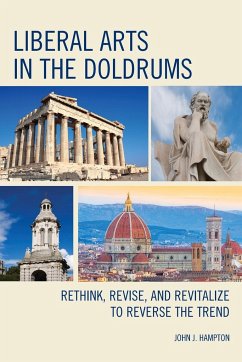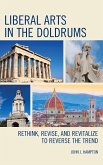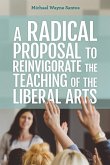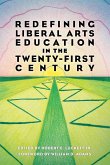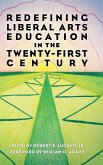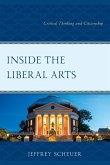- Broschiertes Buch
- Merkliste
- Auf die Merkliste
- Bewerten Bewerten
- Teilen
- Produkt teilen
- Produkterinnerung
- Produkterinnerung
This book argues for changes to the professoriate, restructuring of the liberal arts curriculum, and taking a new perspective to breathe fresh air into the undergraduate environment.
Andere Kunden interessierten sich auch für
![Liberal Arts in the Doldrums Liberal Arts in the Doldrums]() John "Jack" HamptonLiberal Arts in the Doldrums100,99 €
John "Jack" HamptonLiberal Arts in the Doldrums100,99 €![A Radical Proposal to Reinvigorate the Teaching of the Liberal Arts A Radical Proposal to Reinvigorate the Teaching of the Liberal Arts]() Michael Wayne SantosA Radical Proposal to Reinvigorate the Teaching of the Liberal Arts40,99 €
Michael Wayne SantosA Radical Proposal to Reinvigorate the Teaching of the Liberal Arts40,99 €![A Radical Proposal to Reinvigorate the Teaching of the Liberal Arts A Radical Proposal to Reinvigorate the Teaching of the Liberal Arts]() Michael Wayne SantosA Radical Proposal to Reinvigorate the Teaching of the Liberal Arts70,99 €
Michael Wayne SantosA Radical Proposal to Reinvigorate the Teaching of the Liberal Arts70,99 €![Redefining Liberal Arts Education in the Twenty-First Century Redefining Liberal Arts Education in the Twenty-First Century]() Robert E LuckettRedefining Liberal Arts Education in the Twenty-First Century45,99 €
Robert E LuckettRedefining Liberal Arts Education in the Twenty-First Century45,99 €![Inside the Liberal Arts Inside the Liberal Arts]() Jeffrey ScheuerInside the Liberal Arts105,99 €
Jeffrey ScheuerInside the Liberal Arts105,99 €![Redefining Liberal Arts Education in the Twenty-First Century Redefining Liberal Arts Education in the Twenty-First Century]() Robert E LuckettRedefining Liberal Arts Education in the Twenty-First Century135,99 €
Robert E LuckettRedefining Liberal Arts Education in the Twenty-First Century135,99 €![Inside the Liberal Arts Inside the Liberal Arts]() Jeffrey ScheuerInside the Liberal Arts47,99 €
Jeffrey ScheuerInside the Liberal Arts47,99 €-
-
-
This book argues for changes to the professoriate, restructuring of the liberal arts curriculum, and taking a new perspective to breathe fresh air into the undergraduate environment.
Hinweis: Dieser Artikel kann nur an eine deutsche Lieferadresse ausgeliefert werden.
Hinweis: Dieser Artikel kann nur an eine deutsche Lieferadresse ausgeliefert werden.
Produktdetails
- Produktdetails
- Verlag: Globe Pequot Publishing Group Inc/Bloomsbury
- Seitenzahl: 238
- Erscheinungstermin: 13. September 2017
- Englisch
- Abmessung: 229mm x 152mm x 14mm
- Gewicht: 393g
- ISBN-13: 9781475837964
- ISBN-10: 1475837968
- Artikelnr.: 48138630
- Herstellerkennzeichnung
- Produktsicherheitsverantwortliche/r
- Europaallee 1
- 36244 Bad Hersfeld
- gpsr@libri.de
- Verlag: Globe Pequot Publishing Group Inc/Bloomsbury
- Seitenzahl: 238
- Erscheinungstermin: 13. September 2017
- Englisch
- Abmessung: 229mm x 152mm x 14mm
- Gewicht: 393g
- ISBN-13: 9781475837964
- ISBN-10: 1475837968
- Artikelnr.: 48138630
- Herstellerkennzeichnung
- Produktsicherheitsverantwortliche/r
- Europaallee 1
- 36244 Bad Hersfeld
- gpsr@libri.de
John J. Hampton is a Professor of Business at St. Peter's University in New Jersey. In a faculty capacity, he has been an endowed chair holder twice, department chair, and director of divisions of research and graduate business programs. He was the dean of the schools of business at Seton Hall and Connecticut State universities and evening school at Saint Peters. He was provost of the College of Insurance and SUNY Maritime College, both in New York City. Jack is the author of more than 30 books, two of which were recognized with innovation awards (2008 and 2012). The latter book was also selected by the American Library Association as one of three outstanding business reference books of 2012.
Preface PART 1. REPLACING PAROCHIALISM IN THE LIBERAL ARTS 1. What's the
difference between believing and knowing? Is your truth everybody's truth?
2. Are we fighting a decline in critical thinking? Is "truthiness" really a
word in the dictionary? 3. What does it mean to be an educated person? Is
everybody talking the same language? PART 2. REFORMING THE PUBLIC
PERCEPTION OF HIGHER EDUCATION 4. Is it peacetime or wartime in higher
education? Do we have to respond to attacks on the liberal arts? 5. What's
the big picture of the liberal arts? Where are we going? 6. Why should we
listen to weak signals? How long can we ignore the obvious? 7. Are liberals
and conservatives at war on the campus? 8. Do reputation and accreditation
matter? Would anyone hire Plato if he did not have a doctoral degree? PART
3. REVISING THE PROFESSORIATE. 9. Do we still need professors in the
classroom? Why are we paying these people? 10. Does the classroom offer
status for professors? When was the last time anyone praised your teaching?
11. Do professors need both cognitive and emotional intelligence? If we
understand the great ideas, why do we need more? 12. Can professors help us
improve decision making? If we only know the theory, is that enough? PART
4. RESTRUCTURING THE CURRICULUM 13. Why should professors encourage
students to take chances? What good things might happen if we leave our
comfort zones? 14. What's the big deal about context in a liberal arts
education? Can't we just talk for 75 minutes or so? 15. Why should
professors encourage pursuing tipping points and sticky messages? What's
all the commotion about unstoppable change? 16. How should the liberal arts
handle intuitive thinking? When do we have enough information to decide?
17. How should the liberal arts handle disruptive innovation? Will we break
if we don't prepare to bend? PART 5. REACHING BEYOND THE CLASSROOM. 18. Why
should professors help students understand risk, uncertainty, and
opportunity? What's all this talk about the future? 19. Do professors know
what they think they know? What is the danger of too much confidence? 20.
Is collaboration the hallmark of a liberal arts education? Can people see
further if they stand on the shoulders of others? 21. How should professors
handle irrational behavior? Why do people make such odd decisions? 22. How
does it all come together? What do we know at the end of our journey?
difference between believing and knowing? Is your truth everybody's truth?
2. Are we fighting a decline in critical thinking? Is "truthiness" really a
word in the dictionary? 3. What does it mean to be an educated person? Is
everybody talking the same language? PART 2. REFORMING THE PUBLIC
PERCEPTION OF HIGHER EDUCATION 4. Is it peacetime or wartime in higher
education? Do we have to respond to attacks on the liberal arts? 5. What's
the big picture of the liberal arts? Where are we going? 6. Why should we
listen to weak signals? How long can we ignore the obvious? 7. Are liberals
and conservatives at war on the campus? 8. Do reputation and accreditation
matter? Would anyone hire Plato if he did not have a doctoral degree? PART
3. REVISING THE PROFESSORIATE. 9. Do we still need professors in the
classroom? Why are we paying these people? 10. Does the classroom offer
status for professors? When was the last time anyone praised your teaching?
11. Do professors need both cognitive and emotional intelligence? If we
understand the great ideas, why do we need more? 12. Can professors help us
improve decision making? If we only know the theory, is that enough? PART
4. RESTRUCTURING THE CURRICULUM 13. Why should professors encourage
students to take chances? What good things might happen if we leave our
comfort zones? 14. What's the big deal about context in a liberal arts
education? Can't we just talk for 75 minutes or so? 15. Why should
professors encourage pursuing tipping points and sticky messages? What's
all the commotion about unstoppable change? 16. How should the liberal arts
handle intuitive thinking? When do we have enough information to decide?
17. How should the liberal arts handle disruptive innovation? Will we break
if we don't prepare to bend? PART 5. REACHING BEYOND THE CLASSROOM. 18. Why
should professors help students understand risk, uncertainty, and
opportunity? What's all this talk about the future? 19. Do professors know
what they think they know? What is the danger of too much confidence? 20.
Is collaboration the hallmark of a liberal arts education? Can people see
further if they stand on the shoulders of others? 21. How should professors
handle irrational behavior? Why do people make such odd decisions? 22. How
does it all come together? What do we know at the end of our journey?
Preface PART 1. REPLACING PAROCHIALISM IN THE LIBERAL ARTS 1. What's the
difference between believing and knowing? Is your truth everybody's truth?
2. Are we fighting a decline in critical thinking? Is "truthiness" really a
word in the dictionary? 3. What does it mean to be an educated person? Is
everybody talking the same language? PART 2. REFORMING THE PUBLIC
PERCEPTION OF HIGHER EDUCATION 4. Is it peacetime or wartime in higher
education? Do we have to respond to attacks on the liberal arts? 5. What's
the big picture of the liberal arts? Where are we going? 6. Why should we
listen to weak signals? How long can we ignore the obvious? 7. Are liberals
and conservatives at war on the campus? 8. Do reputation and accreditation
matter? Would anyone hire Plato if he did not have a doctoral degree? PART
3. REVISING THE PROFESSORIATE. 9. Do we still need professors in the
classroom? Why are we paying these people? 10. Does the classroom offer
status for professors? When was the last time anyone praised your teaching?
11. Do professors need both cognitive and emotional intelligence? If we
understand the great ideas, why do we need more? 12. Can professors help us
improve decision making? If we only know the theory, is that enough? PART
4. RESTRUCTURING THE CURRICULUM 13. Why should professors encourage
students to take chances? What good things might happen if we leave our
comfort zones? 14. What's the big deal about context in a liberal arts
education? Can't we just talk for 75 minutes or so? 15. Why should
professors encourage pursuing tipping points and sticky messages? What's
all the commotion about unstoppable change? 16. How should the liberal arts
handle intuitive thinking? When do we have enough information to decide?
17. How should the liberal arts handle disruptive innovation? Will we break
if we don't prepare to bend? PART 5. REACHING BEYOND THE CLASSROOM. 18. Why
should professors help students understand risk, uncertainty, and
opportunity? What's all this talk about the future? 19. Do professors know
what they think they know? What is the danger of too much confidence? 20.
Is collaboration the hallmark of a liberal arts education? Can people see
further if they stand on the shoulders of others? 21. How should professors
handle irrational behavior? Why do people make such odd decisions? 22. How
does it all come together? What do we know at the end of our journey?
difference between believing and knowing? Is your truth everybody's truth?
2. Are we fighting a decline in critical thinking? Is "truthiness" really a
word in the dictionary? 3. What does it mean to be an educated person? Is
everybody talking the same language? PART 2. REFORMING THE PUBLIC
PERCEPTION OF HIGHER EDUCATION 4. Is it peacetime or wartime in higher
education? Do we have to respond to attacks on the liberal arts? 5. What's
the big picture of the liberal arts? Where are we going? 6. Why should we
listen to weak signals? How long can we ignore the obvious? 7. Are liberals
and conservatives at war on the campus? 8. Do reputation and accreditation
matter? Would anyone hire Plato if he did not have a doctoral degree? PART
3. REVISING THE PROFESSORIATE. 9. Do we still need professors in the
classroom? Why are we paying these people? 10. Does the classroom offer
status for professors? When was the last time anyone praised your teaching?
11. Do professors need both cognitive and emotional intelligence? If we
understand the great ideas, why do we need more? 12. Can professors help us
improve decision making? If we only know the theory, is that enough? PART
4. RESTRUCTURING THE CURRICULUM 13. Why should professors encourage
students to take chances? What good things might happen if we leave our
comfort zones? 14. What's the big deal about context in a liberal arts
education? Can't we just talk for 75 minutes or so? 15. Why should
professors encourage pursuing tipping points and sticky messages? What's
all the commotion about unstoppable change? 16. How should the liberal arts
handle intuitive thinking? When do we have enough information to decide?
17. How should the liberal arts handle disruptive innovation? Will we break
if we don't prepare to bend? PART 5. REACHING BEYOND THE CLASSROOM. 18. Why
should professors help students understand risk, uncertainty, and
opportunity? What's all this talk about the future? 19. Do professors know
what they think they know? What is the danger of too much confidence? 20.
Is collaboration the hallmark of a liberal arts education? Can people see
further if they stand on the shoulders of others? 21. How should professors
handle irrational behavior? Why do people make such odd decisions? 22. How
does it all come together? What do we know at the end of our journey?

